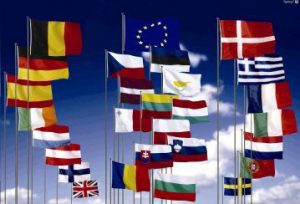International programmes
 International cooperation is carried out on various planes: joint implementation of multilateral and bilateral international projects, organisation of foreign studies and internships for students and admission of foreign students to study at WSKFiT. The cooperation programme also provides for mutual visits and lectures of specialists in physical education and administration.
International cooperation is carried out on various planes: joint implementation of multilateral and bilateral international projects, organisation of foreign studies and internships for students and admission of foreign students to study at WSKFiT. The cooperation programme also provides for mutual visits and lectures of specialists in physical education and administration.
Since 2007, the University has participated in the Erasmus programme, currently we are making efforts to join the Erasmus+ programme, which will enable the exchange of students with partner universities from the European Union and the European Economic Area as well as with universities from a candidate country – Turkey, with which cooperation agreements have been signed. The University is working on constant extension of the offer for students so that every interested student, who achieves very good academic results and has a good command of a foreign language, has a chance to take advantage of the possibility to complete a part of their studies in one of the partner universities.
- Erasmus+ Studies (one or two semesters of studies abroad),
- Erasmus+ Internships (student placements abroad),
- DAAD (studies and placements abroad).
- Odysseus – a service of the Ministry of Foreign Affairs
The above activities can be implemented through the following actions:
Comenius – Action for increasing the quality of education in school education by supporting international exchange between schools, teacher education and in-service training establishments, as well as foreign language teaching.
Erasmus – Action is addressed to universities. It aims to promote the European area of higher education. Under this action student and university teacher exchanges are organised and networks of cooperating universities are created. .
Grundtvig – This action is addressed to entities dealing with adult education. It provides an opportunity to improve the qualifications of people teaching adults, promotes the idea of „lifelong learning”, as well as to create networks of cooperating higher education institutions.
Lingua – Action aimed at promoting lifelong language learning.
Minerva – promotes distance learning and the use of information and communication technologies (ICT) in education.
Eurydice – Action aims to create an information network about the educational systems, implemented innovations, carried out reforms and main directions of educational policy in countries.
Arion – The action aims to organise study visits for representatives of educational administration of different management levels, which enable learning about educational systems in other European countries.
IErasmus Intensive Language Courses (EILC) are courses in lesser-known languages of the EU and other countries participating in the Erasmus programme. These courses are intended for Erasmus grant holders who come to study or work in a country where a less widely spoken and taught language is spoken. In this country, courses are organised by selected language teaching centres.
Countries where Erasmus Intensive Language Courses are organised:
Belgium (Flemish Community), Bulgaria, Cyprus, Czech Republic, Denmark, Estonia, Finland, Greece, Hungary, Iceland, Italy, Latvia, Lithuania, Malta, Netherlands, Norway, Poland, Portugal, Romania, Slovakia, Slovenia, Sweden, Turkey.
Candidates are recruited directly by the institutions organising the courses and in some destination countries by the Erasmus National Agencies.
Accommodation and meals for participants
The course organiser should guarantee that participants can stay in student residences and use student canteens.
Fees
There is no fee for taking part in the course. Participants shall, however, pay for accommodation and meals as well as additional costs related to accommodation and meals on tourist trips within the framework of the cultural programme.
Financing your stay
Students finance their stay on the EILC course themselves, or they may receive a grant for the period of the course from their home university, provided that the university has decided to pay an additional grant to all its students taking part in the EILC. The university’s decision depends on its financial possibilities.
